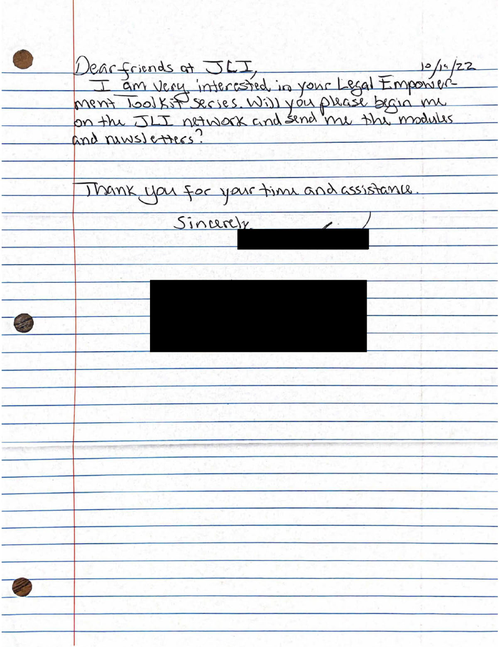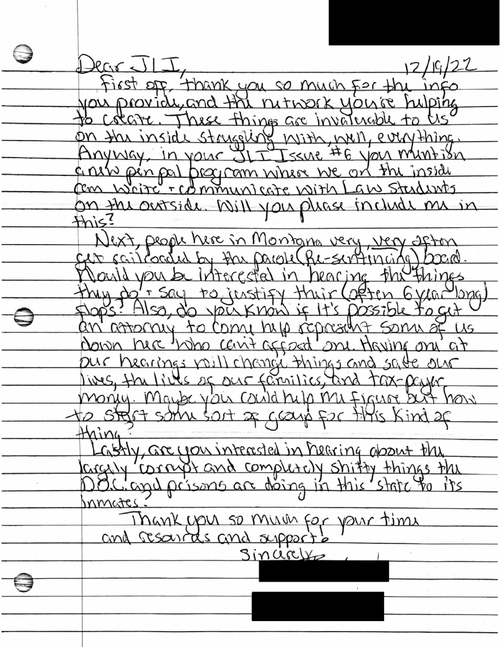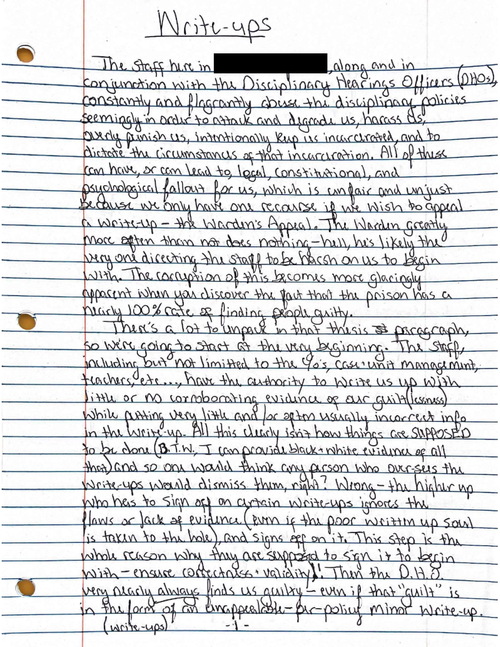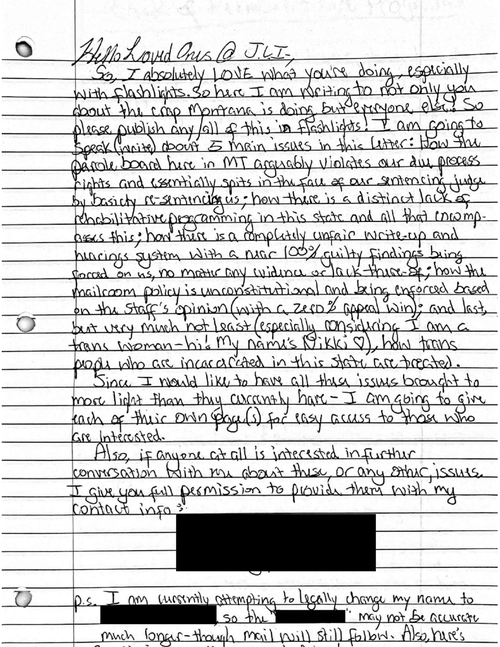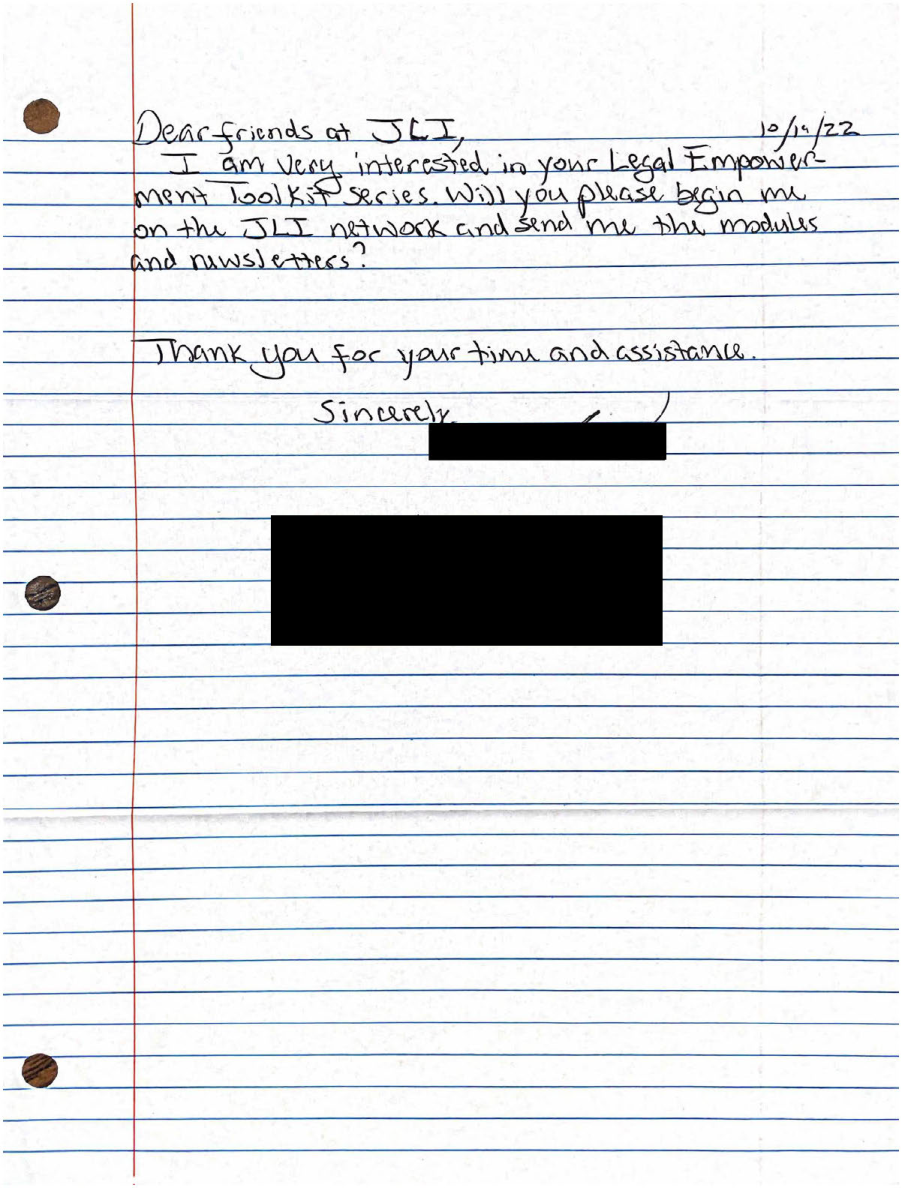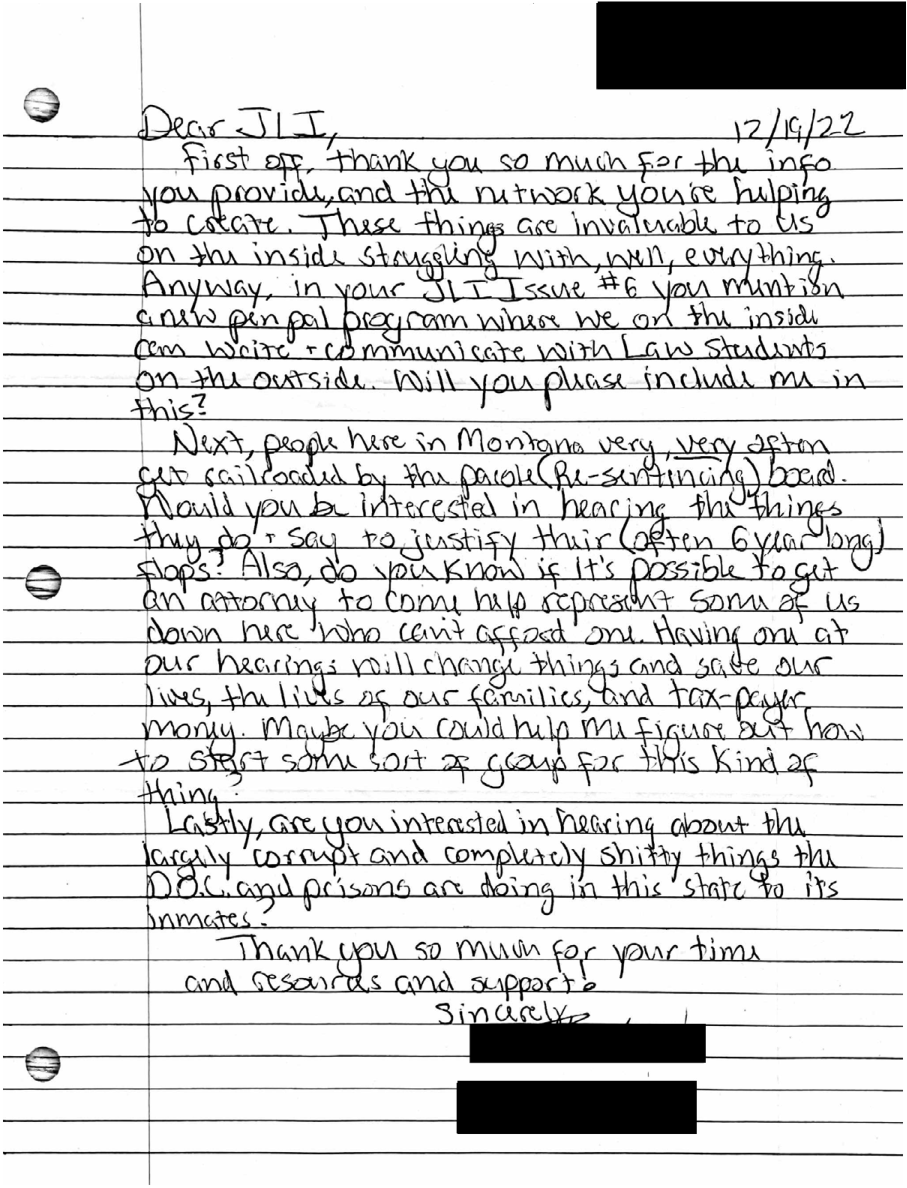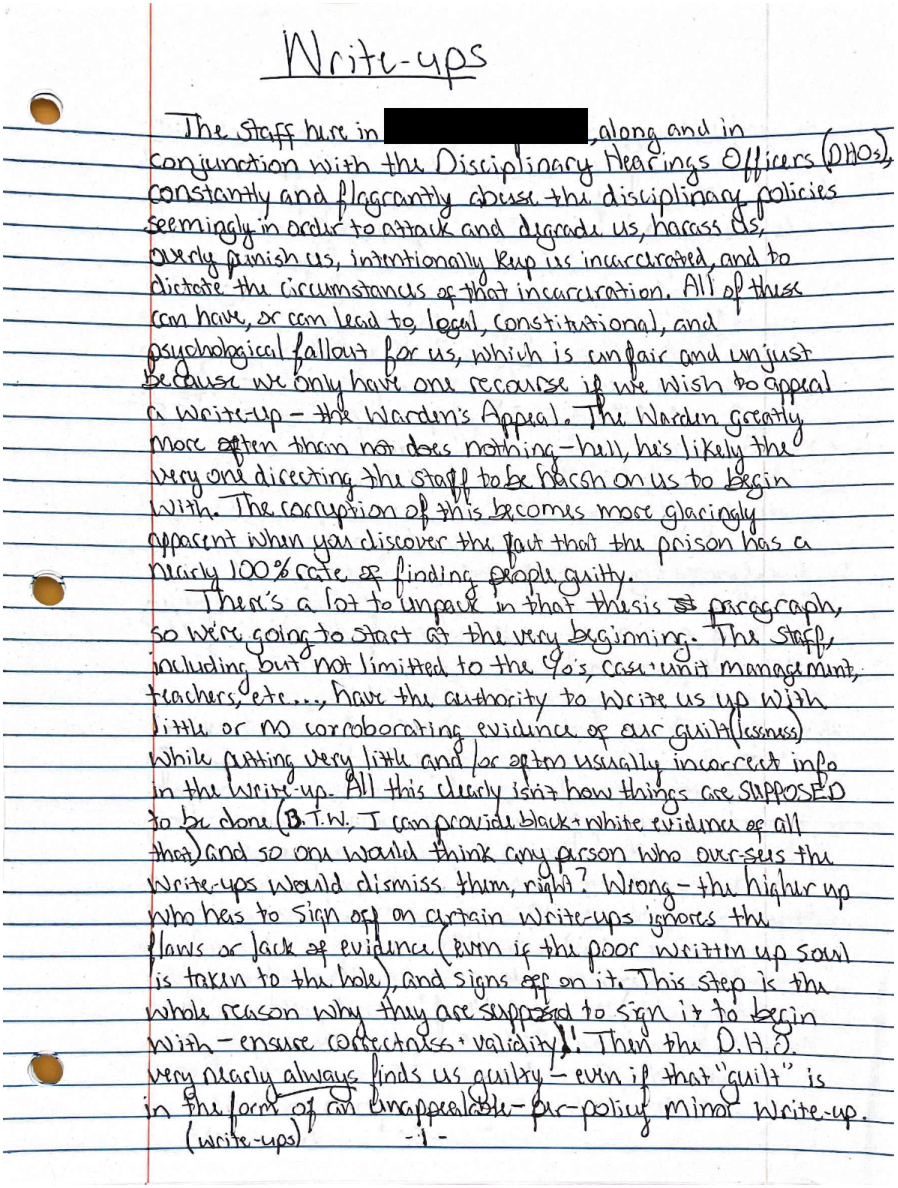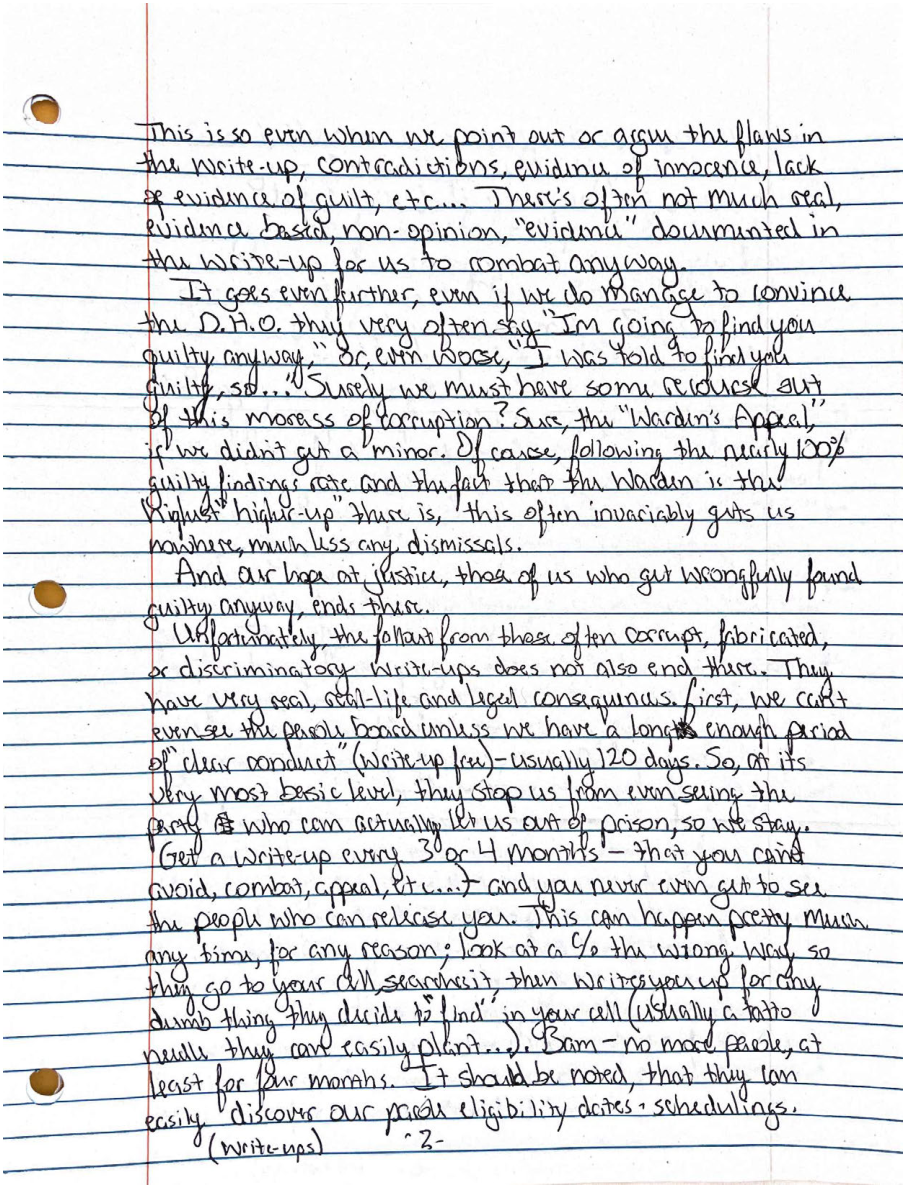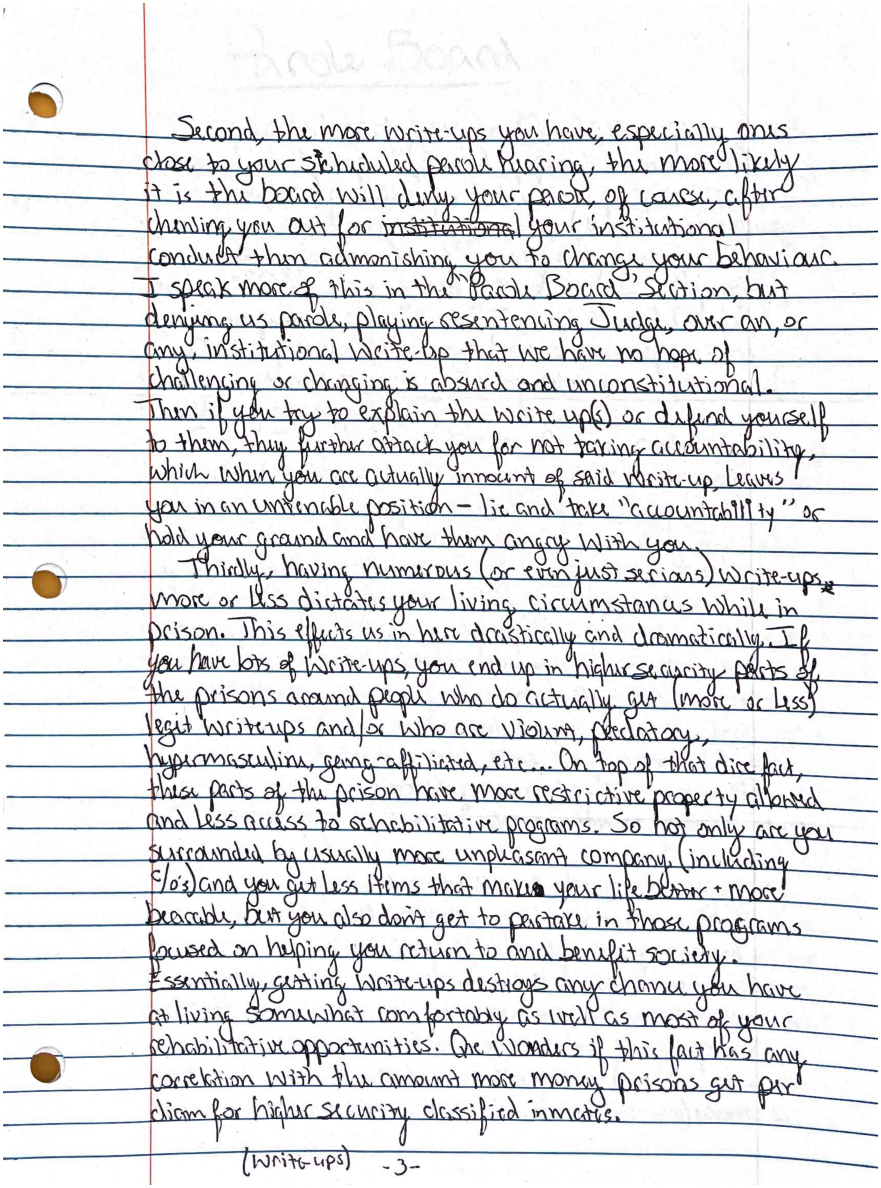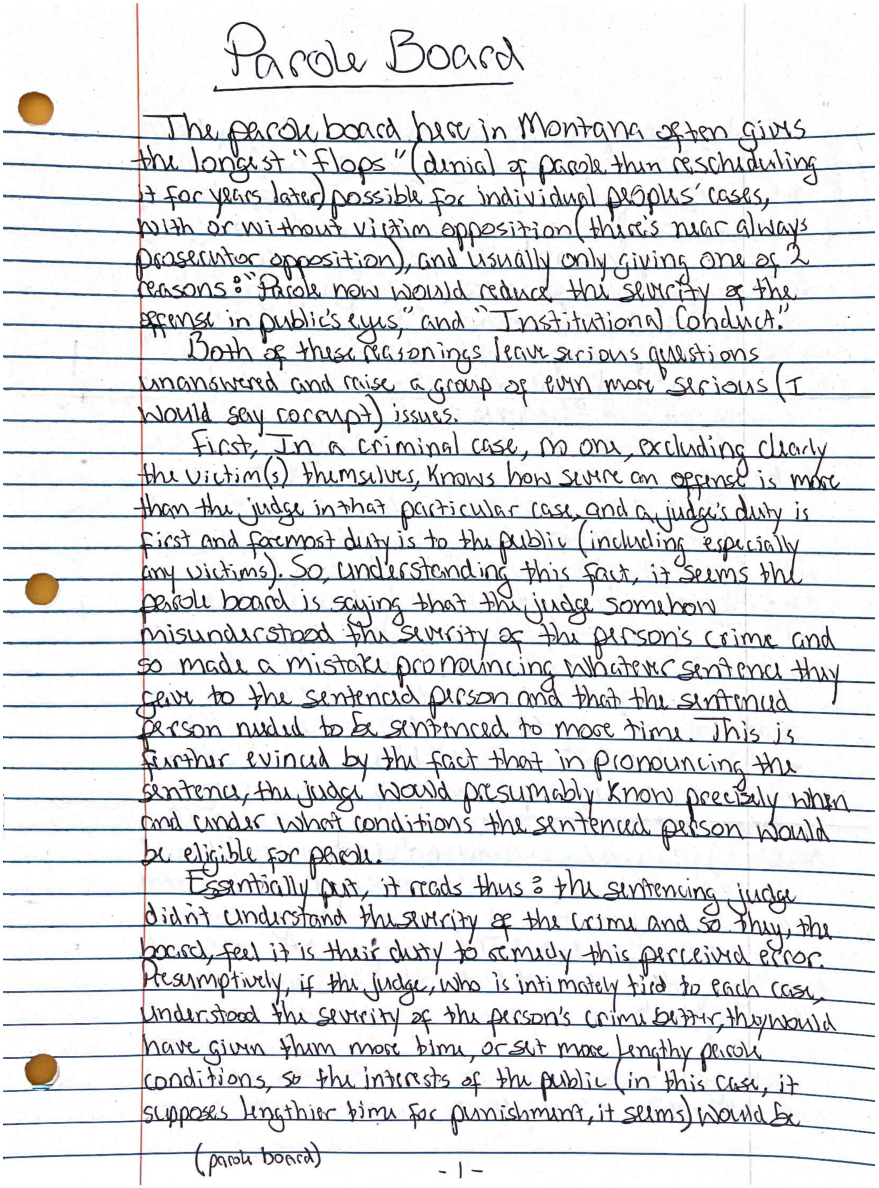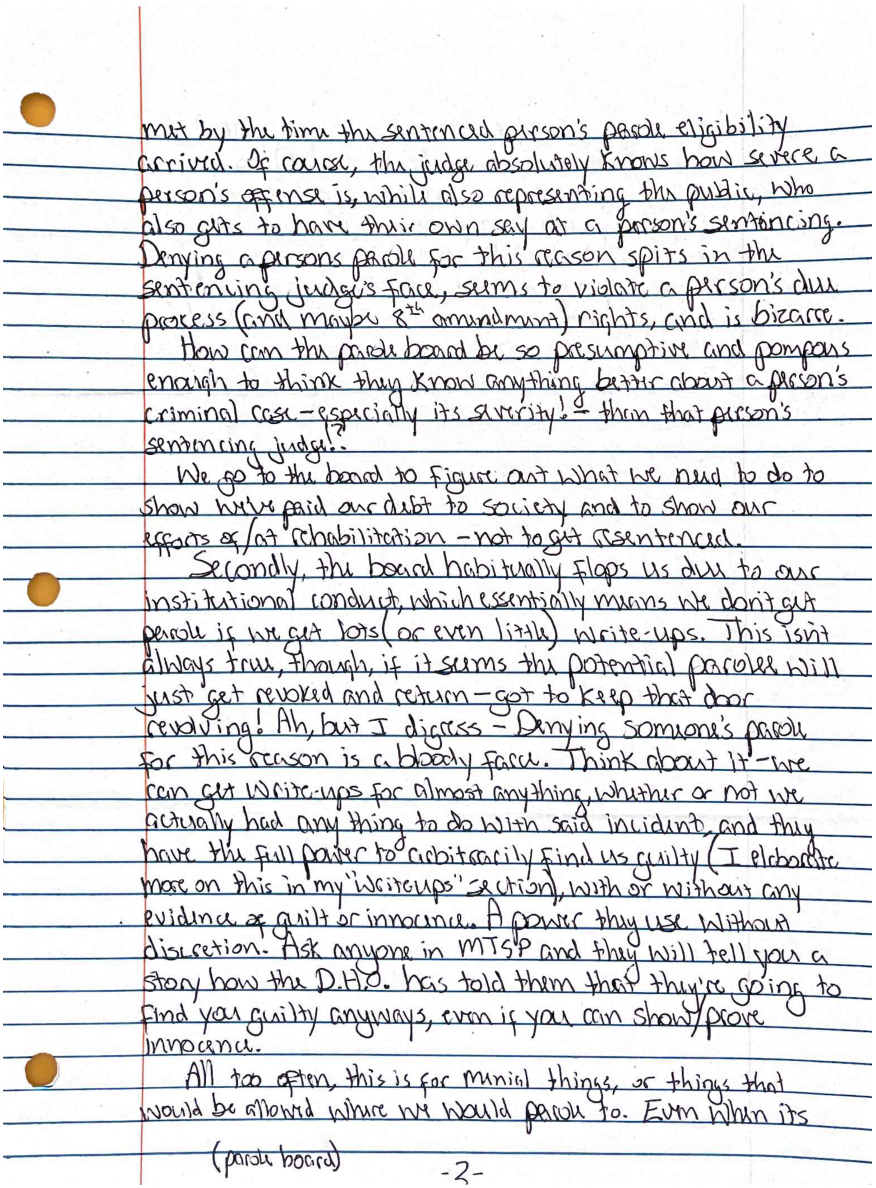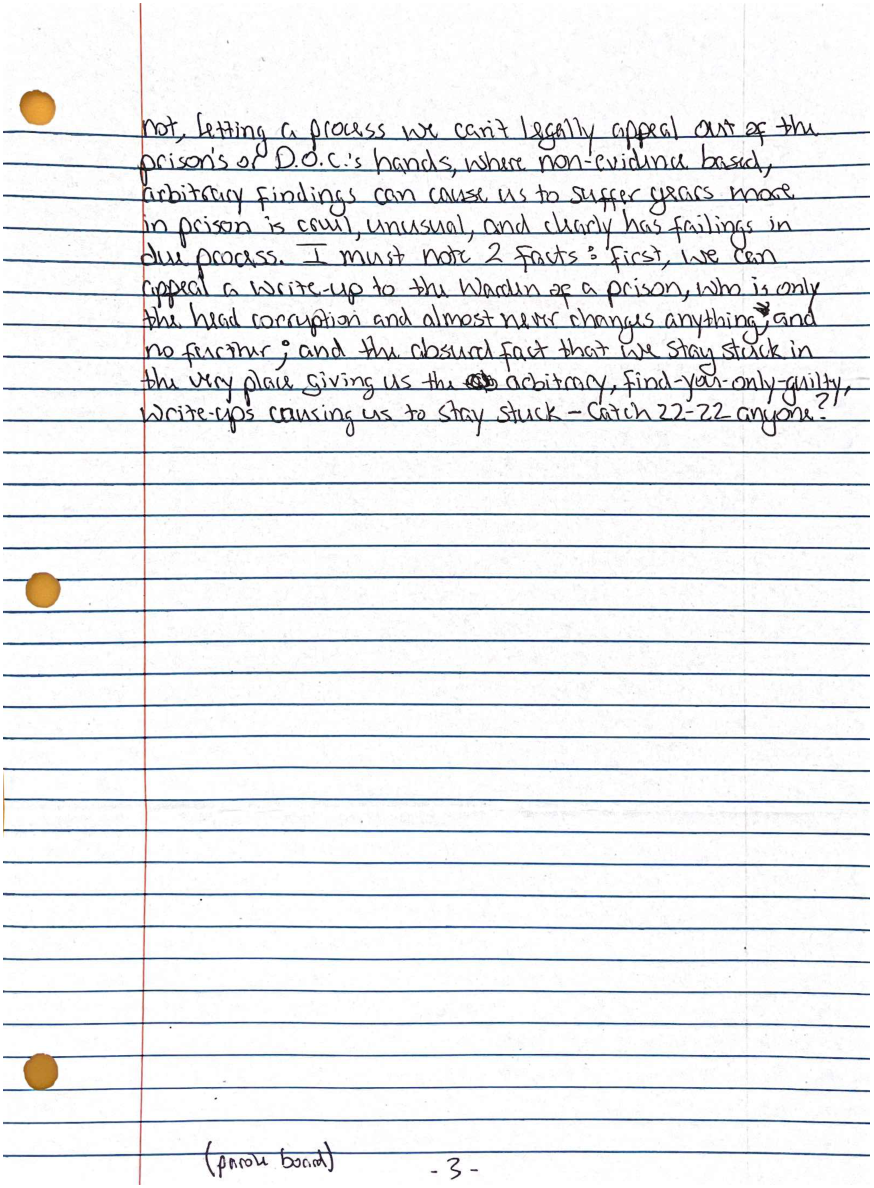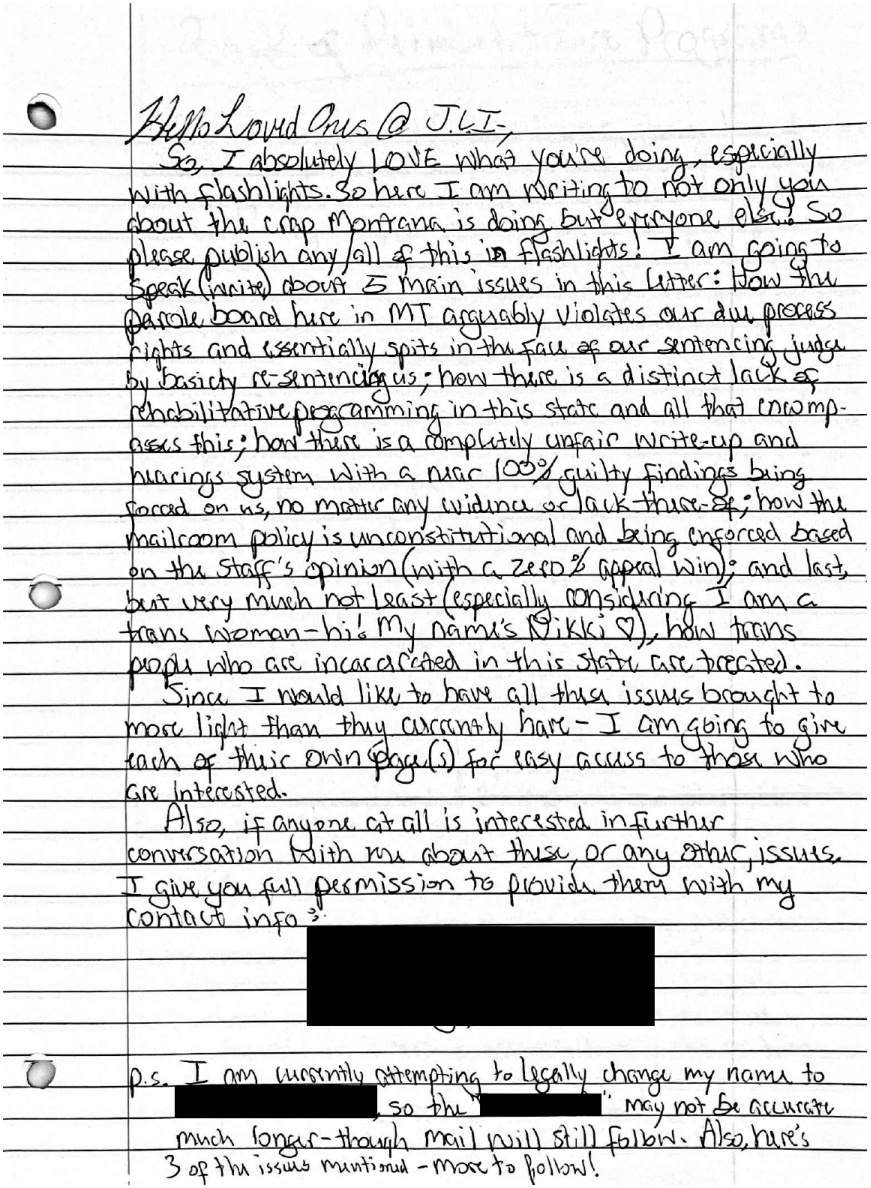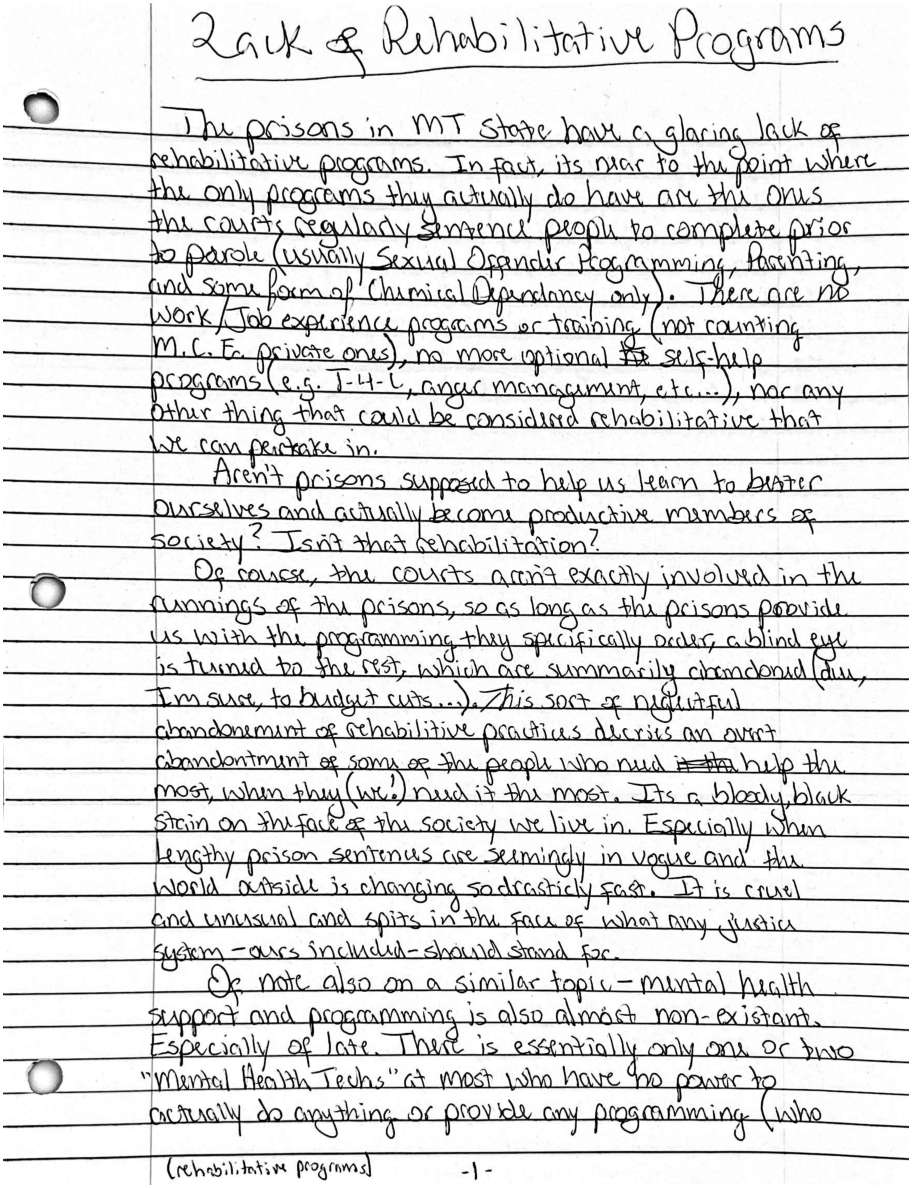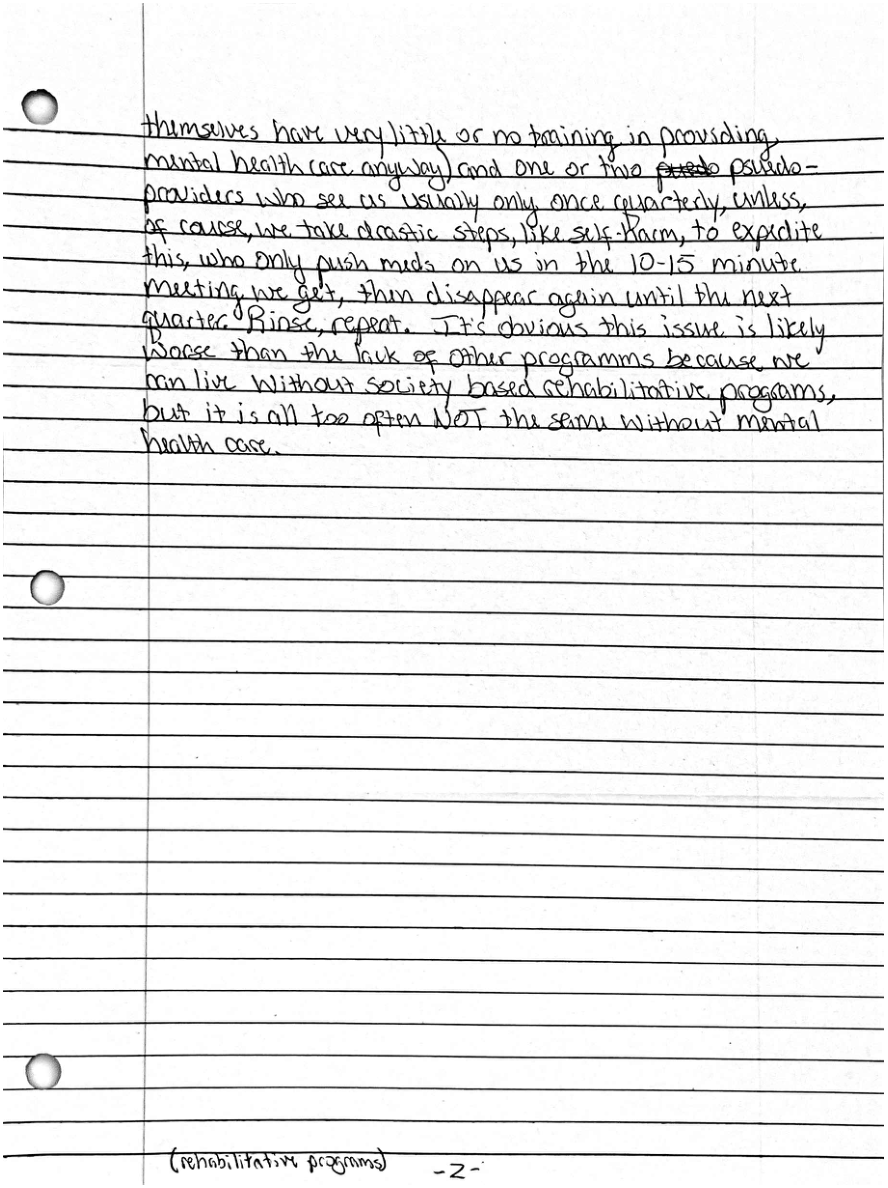Nikki Notsuki
I wish the world could read this letter so that they could know this:all letters
Nikki Notsuki
transcription
Dear friends at JLI, 10/14/22
I am very interested in your Legal Empower-
ment Toolkit series. Will you please begin me
on the JLI network and send me the modules
and newsletters?
Thank you for your time and assistance.
Sincerely,
[REDACTED]
Nikki Notsuki [REDACTED]
[REDACTED]
Nikki Notsuki
transcription
Nikki Notsuki [REDACTED]
[REDACTED]
Dear JLI, 12/19/22
First off, thank you so much for the info.
you provide, and the network you're helping
to create. These things are invaluable to us
on the inside struggling with, well, everything.
Anyway, in your JLI Issue #6 you mention
a new pen pal program where we on the inside
can write + communicate with Law Students
on the outside. Will you please include me in
this?
Next, people here in Montana very, very often
get railroaded by the parole (Re-sentencing) board.
Would you be interested in hearing the things
they do + say to justify their (often 6 year long)
flops? Also, do you know if it's possible to get
an attorney to come help represent some of us
down here who can't afford one. Having one at
our hearings will change things and save our
lives, the lives of our families, and tax-payer
money. Maybe you could help me figure out how
to start some sort of group for this kind of
thing?
Lastly, are you interested in hearing about the
largely corrupt and completely shifty things the
D.O.C. and prisons are doing in this state to its
inmates?
Thank you so much for your time
and resources and support!
Sincerely,
[REDACTED]
Nikki Notsuki
Nikki Notsuki
transcription
Write-ups
The staff here in [Redacted], along and in
conjunction with the Disciplinary Hearings Officers (DHOs),
constantly and flagrantly abuse the disciplinary policies
seemingly in order to attack and degrade us, harass us,
overly punish us, intentionally keep us incarcerated, and to
dictate the circumstances of that incarceration. All of these
can have, or can lead to legal constitutional, and
psychological fallout for us, which is unfair and unjust
because we only have one recourse if we wish to appeal
a write-up - the Warden's Appeal. The Warden greatly
more often than not does nothing - hell, he's likely the
very one directing the staff to be harsh on us to begin
with. The corruption of this becomes more glaringly
apparent when you discover the fact that the prison has a
nearly 100% rate of finding people guilty.
There's a lot to unpack in that thesis paragraph,
so we're going to start at the very beginning. The staff,
including, but not limited to the c/o's case + unit management,
teachers, etc ..., have the authority to write us up with
little or no corroborating evidence of our guilt(lessness)
while putting very little and /or often usually incorrect info
in the write-up. All this clearly isn't how things are SUPPOSED
to be done (B.T.W., I can provide black + white evidence of all
that) and so one would think any person who over-sees the
write-ups would dismiss them, right? Wrong - the higher up
who has to sign off on certain write-ups ignores the
flaws or lack of evidence (even if the poor written up soul
is taken to the hole), and signs off on it. This step is the
whole reason why they are supposed to sign it to begin
with - ensure correctness + validity! Then the D.H.O.
very nearly always finds us guilty - even if that "guilt" is
in the form of an unappealable-per-policy minor write-up.
(write-ups) -1 -
[Page 2]
This is so even when we point out or argue the flaws in
the write-up, contradictions, evidence of innocence, lack
of evidence of guilt, etc... There's often not much real,
evidence based, non-opinion, "evidence" documented in
the write-up for us to combat anyway.
It goes even further, even if we do manage to convince
the D. H. O. they very often say "I'm going to find you
guilty any way," or, even worse," I was told to find you
guilty, so..." Surely we must have some recourse out
of this morass of corruption? Sure, the "Warden's Appeal,"
if we didn't get a minor. Of course, following the nearly 100%
guilty findings rate and the fact that the Warden is the
highest "higher-up" there is, this often invariably gets us
nowhere, much less any dismissals.
And our hope at, justice, those of us who get wrongfully found
guilty anyway, ends there.
Unfortunately the fallout from these often corrupt, fabricated,
or discriminatory write-ups does not also end there. They
have very real, real-life and legal consequences. First, we can't
even see the parole board unless we have a long enough period
of "clear conduct"(write-up free)-usually 120 days. So, at its
very most basic level, they stop us from even seeing the
party who can actually let us out of prison, so we stay.
Get a write-up every 3 or 4 months - that you can't
avoid, combat, appeal, etc... - and you never even get to see
the people who can release you. This can happen pretty much
any time, for any reason; look at a c/o the wrong way so
they go to your cell, searches it, then writes you up for any
dumb thing they decide to "find" in your cell (usually a tatto
needle they can easily plant...). Bam - no more people, at
least for four months. It should be noted, that they can
easily discover our parole eligibility dates + schedulings.
(write-ups) - 2-
[Page 3]
Second, the more write-ups you have, especially ones
close to your scheduled parole hearing, the more likely
it is the board will deny your pack, of course, after
chewing you out for your institutional
conduct then admonishing you to change your behaviour.
I speak more of this in the "Parole Board" Section, but
denying us parole, playing resentencing Judge, over an, or
any, institutional write-up that we have no hope of
challenging or changing is absurd and unconstitutional.
Then if you try to explain the write up(s) or defend yourself
to them, they further attack you for not taking accountability,
which when you are actually innocent of said write-up, Leaves
you in an untenable position - lie and take "accountability" or
hold your ground and have them angry with you.
Thirdly, having numerous (or even just serious) write-ups
more or Less dictates your living circumstances while in
prison. This effects us in here drastically and dramatically. If
you have lots of write-ups, you end up in higher security parts of
the prisons around people who do actually get (more or Less)
legit write-ups and/or who are violent, predatory,
hypermasculine, gang-affiliated, etc... On top of that dire fact,
these parts of the prison have more restrictive property allowed
and Less access to rehabilitative programs. So not only are you
surrounded by usually more unpleasant company, (including
c/o's) and you get Less items that makes your life better + more
bearable, but you also don't get to partake in those programs
focused on helping you return to and benefit society.
Essentially, getting write-ups destroys any chance you have
at living somewhat comfortably as well as most of your
rehabilitative opportunities. One wonders of this fact has any
correlation with the amount more money prisons get per
diam for higher security classified inmates.
(write-ups) - 3-
[Page 4]
Parole Board
The parole board here in Montana often gives
the longest "flops"(denial of parole then rescheduling
it for years later) possible for individual peoples' cases,
with or without victim opposition (there's near always
prosecutor opposition), and usually only giving one of 2
reasons: "Parole now would reduce the severity of the
offense in public's eyes," and "Institutional Conduct."
Both of these reasonings leave serious questions
unanswered and raise a group of even more serious (I
would say corrupt) issues.
First, In a criminal case, no one, excluding clearly
the victim(s) themselves, knows how severe an offense is more
than the judge in that particular case and a judge's duty is
first and foremost duty is to the public (including especially
any victims). So, understanding this fact, it seems the
parole board is saying that the judge somehow
misunderstood the severity of the person's crime and
so made a mistake pronouncing whatever sentence they
gave to the sentenced person and that the sentenced
person needed to be sentenced to more time. This is
further evinced by the fact that in pronouncing the
sentence, the judge would presumably know precisely when
and under what conditions the sentenced person would
be eligible for parole.
Essentially put, it reads thus: the sentencing judge
didn't understand the severity of the crime and so they, the
board, feel it is their duty to remedy this perceived error.
Presumptively, if the judge, who is intimately tied to each case,
understood the severity of the person's crime better, they would
have given them more time, or set more Lengthy parole
conditions, so the interests of the public (in this case, it
supposes lengthier time for punishment, it seems) would be
(parole board) - 1-
[Page 4]
met by the time the sentenced person's parole eligibility
arrived. Of course, the judge absolutely knows how severe a
person's offense is, while also representing the public, who
also gets to have their own say at a person's sentencing.
Denying a persons parole for this reason spits in the
sentencing judge's face, seems to violate a person's due
process (and maybe 8th amendment) rights, and is bizarre.
How can the parole board be so presumptive and pompous
enough to think they know anything better about a person's
criminal case - especially its severity! - than that person's
sentencing judge!?
We go to the board to figure out what we need to do to
show we've paid our debt to society and to show our
efforts of/at rehabilitation -not to get resentenced.
Secondly, the board habitually flops us due to our
institutional conduct, which essentially means we don't get
parole if we get lots (or even little) write-ups. This isn't
always true, though, if it seems the potential parolee will
just get revoked and return-got to keep that door
revolving! Ah, but I digress - Denying someone's parole
for this reason is a bloody farce. Think about it-we
can get write-ups for almost anything, whether or not we
actually had any thing to do with said incident, and they
have the full power to arbitrarily find us guilty (I elaborate
more on this in my "write-ups" section), with or without any
evidence of guilt or innocence. A power they use without
discretion. Ask anyone in MTSP and they will tell you a
story how the D.H.O. has told them that they're going to
find you guilty anyways, even if you can show/prove
innocence.
All too often, this is for menial things, or things that
would be allowed where we would parole to. Even when its
(parole board) -2-
[Page 5]
not, Letting a process we can't legally appeal out of the
prison's or D.O.C.'s hands, where non-evidence based,
arbitrary findings can cause us to suffer years more
in prison is cruel, unusual, and clearly has failings in
due process. I must note 2 facts: first, we can
appeal a write-up to the Warden of a prison, who is only
the head corruption and almost never changes anything, and
no further; and the absurd fact that we stay stuck in
the very place giving us the arbitrary, find-you-only-guilty,
write-ups causing us to stay stuck - catch 22-22 anyone?
(parole board) - 3 -
Nikki Notsuki
transcription
Hello Loved Ones @ J.LI.,
So, I absolutely LOVE what you're doing, especially
with flashlights. So here I am writing to not only you
about the crap Montana is doing but everyone else! So
please publish any/all of this in flashlights! I am going to
speak (write) about 5 main issues in this Letter: How the
parole board here in MT arguably violates our due process
rights and essentially spits in the face of our sentencing judge
by basicly re-sentencing us; how there is a distinct lack of
rehabilitative programming in this state and all that encomp-
asses this; how there is a completely unfair write-up and
hearings system with a near 100% guilty findings being
forced on us, no matter any evidence or lack there-of; how the
mailroom policy is unconstitutional and being enforced based
on the staff's opinion (with a zero % appeal win); and last,
but very much not Least (especially considering I am a
trans woman-hi! My name's Nikki <3), how trans
people who are incarcerated in this state are treated.
Since I would like to have all these issues brought to
more light than they currently have - I am going to give
each of their own page(s) for easy access to those who
are Interested.
Also, if anyone at all is interested in further
conversation with me about these, or any other, issues,
I give you full permission to provide them with my
contact info:
[REDACTED]
p.s. I am currently attempting to Legally change my name to
[REDACTED], so the "[REDACTED]" may not be accurate
much longer-though mail will still follow. Also, here's
3 of the issues mentioned -more to follow!
[Page 2]
Lack of Rehabilitative Programs
The prisons in MT State have a glaring lack of
rehabilitative programs. In fact, its near to the point where
the only programs they actually do have are the ones
the courts regularly sentence people to complete prior
to parole (usually Sexual Offender Programming, Parenting
and some form of Chemical Dependancy only). There are no
work/Job experience programs or training (not counting
M. C. E. private ones), no more optional self-help
programs (e.g. T-4-L, anger management, etc...), nor any
other thing that could be considered rehabilitative that
We can partake in.
Aren't prisons supposed to help us learn to better
ourselves and actually become productive members of
society? Isn't that rehabilitation?
Of course, the courts aren't exactly involved in the
runnings of the prisons, so as long as the prisons provide
us with the programming they specifically order, a blind eye
is turned to the rest, which are summarily abandoned (due,
I'm sure, to budget cuts...). This sort of neglectful
abandonment of rehabilitative practices decries an overt
abandonment of some of the people who need help the
most, when they (we!) need it the most. Its a bloody, black
stain on the face of the society we live in. Especially when
Lengthy prison sentences are seemingly in vogue and the
world outside is changing so drasticly fast. It is cruel
and unusual and spits in the face of what any justice
system-ours included-should stand for.
Of note also on a similar topic - mental health
support and programming is also almost non-existant.
Especially of late. There is essentially only one or two
"Mental Health Techs" at most who have no power to
actually do anything or provide any programming (who
(rehabilitative programs) - 1 -
[Page 3]
themselves have very little or no training in providing
mental health care anyway) and one or two psuedo-
providers who see us usually only once quarterly, unless,
of course, we take drastic steps, like self-harm, to expedite
this, who only push meds on us in the 10-15 minute
meeting we get, then disappear again until the next
quarter. Rinse, repeat. It's obvious this issue is likely
worse than the lack of other programs because we
can live without society based rehabilitative programs,
but it is all too often NOT the same without mental
health care.
(rehabilitative programs) - 2 -

